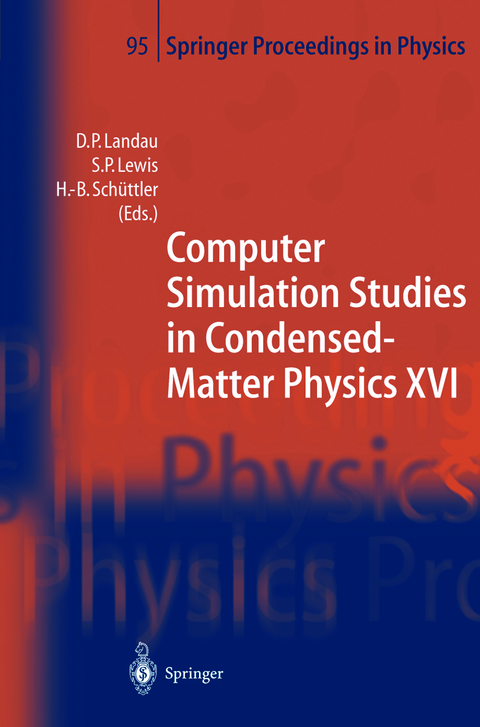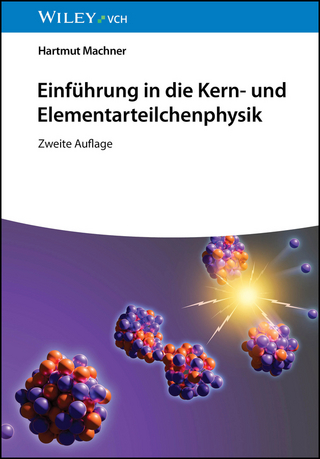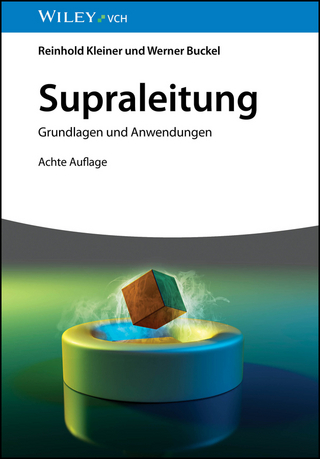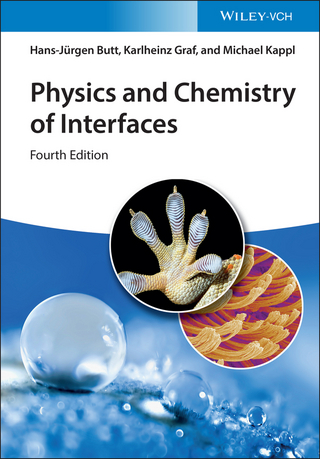
Computer Simulation Studies in Condensed-Matter Physics XVI
Springer Berlin (Verlag)
978-3-642-63923-4 (ISBN)
David P. Landau is the Distinguished Professor of Physics and Director of the Center for Simulational Physics at the University of Georgia.
1 Computer Simulation Studies in Condensed Matter Physics: An Introduction.- I Nonequilibrium Phenomena.- 2. Fast Coarsening and Steady States in a Low-Dimensional Driven System.- 3. A Nonequilibrium Lattice Gas of Two-species: Monte Carlo Investigations.- 4. Stochastic Growth in a Small World.- 5. Flicker Noise in a Model of Coevolving Biological Populations.- II Quantum Phenomena.- 6. Physical and Computational Aspects of Density Functional Spin Dynamics.- 7. Finite Temperature Simulation Based on Lanczos Algorithm for Low-Dimensional Quantum Systems.- 8. Quantum Phase Transitions of Quasi-One-Dimensional Heisenberg Antiferromagnets.- 9. Multi-hole Tunneling between Charge Domains in Doped Antiferromagnets.- 10. Decoherence in Quantum Spin Systems.- 11. Quantum Computing Simulation using the Auxiliary Field Decomposition.- III Phase Transitions.- 12. Quenched Disorder Distributions in Three-Dimensional Diluted Ferromagnets.- 13. Weak Universality of Spin Glasses in Three Dimensions.- 14. Critical Exponents of the Two Dimensional Melting.- 15. Numerical Study of Critical Exponents for Kosterlitz-Thouless Transition Systems.- 16. Critical Wetting and Interface Localization-Derealization Transition in a Double Wedge.- IV Soft Condensed Matter.- 17. Effect of Packing Parameter on Amphiphilic Self-Assembly: A Brownian Dynamics Study.- 18. The Droplet Evaporation/Condensation Transition in a Finite Volume.- 19. Configurational Bias Monte Carlo Applied to Lipid Membranes in the Semi-grand Ensemble to Speed Up Mixing.- 20. Folding Polymer Chains.- 21. Polymer Collapse in High Dimensions: Monte Carlo Simulation of Lattice Models.- 22. Computer Simulation of Polymers: Physics and Methods from Specific to Universal.- V Methods and Pedagogy.- 23. Using Simulations to TeachStatistical Physics.- 24. Visualization of Melting Simulations.- 25. Network Algorithms and Critical Manifolds in Disordered Systems.- 26. Random Graphs as Building Blocks for a Network Model.- 27. Generalized Probability-Changing Algorithm.- 28. Adaptive Integration Method.- VI Simulations of Materials.- 29. Lattice Instabilities of Perovskite Oxides from First Principles.- 30. Monte Carlo Simulations of Metal Monoatomic Layers.- 31. Molecular Dynamics Simulation of Nanoindentation.- List of Contributors.
| Erscheint lt. Verlag | 18.9.2011 |
|---|---|
| Reihe/Serie | Springer Proceedings in Physics |
| Zusatzinfo | IX, 258 p. |
| Verlagsort | Berlin |
| Sprache | englisch |
| Maße | 155 x 235 mm |
| Gewicht | 416 g |
| Themenwelt | Naturwissenschaften ► Physik / Astronomie ► Atom- / Kern- / Molekularphysik |
| Naturwissenschaften ► Physik / Astronomie ► Festkörperphysik | |
| Naturwissenschaften ► Physik / Astronomie ► Thermodynamik | |
| Schlagworte | computer simulation • electronic structures • Helium-Atom-Streuung • Model • molecular dynamics • Monte Carlo • Monte Carlo simulation • PED • phase transitions • Simulation • stem |
| ISBN-10 | 3-642-63923-2 / 3642639232 |
| ISBN-13 | 978-3-642-63923-4 / 9783642639234 |
| Zustand | Neuware |
| Informationen gemäß Produktsicherheitsverordnung (GPSR) | |
| Haben Sie eine Frage zum Produkt? |
aus dem Bereich


